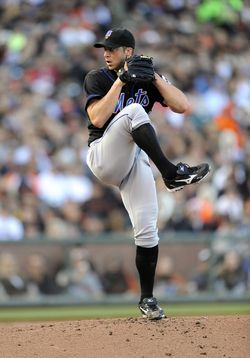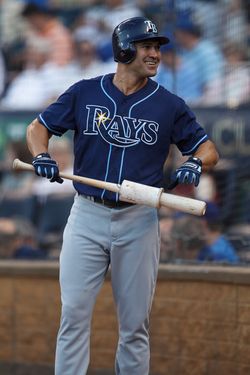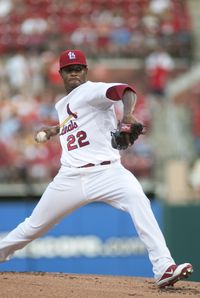Francisco Cordero was already drawing interest from several teams this offseason, but the free agent closer became even more attractive on the open market when his Type A status was modified into a Type B by the new collective bargaining agreement. Now the team that signs Cordero doesn't have to give up a first-round draft pick as compensation, which is good news for the several teams with unprotected first-rounders that have targeted the 36-year-old.
Cordero has been one of the more effective and durable closers in the game, averaging 71 innings, an even 3.00 ERA and a 9.2 K/9 rate over the last nine seasons. Though he turns 37 next year, Cordero seems to be throwing as well as ever at first glance — he posted a 2.45 ERA for the Reds in 2011, allowed a career-low 6.3 H/9, and approached career bests with a 2.8 BB/9 rate and a 1.019 WHIP.
A look at the advanced metrics, however, reveals some major red flags. Cordero also achieved his lowest K/9 rate in any full season, striking out just 5.4 batters per nine innings. His xFIP of 4.14 and his BABIP of .214 indicate that Cordero had some luck on his side last year, and the fact that his ground ball rate rose to a career-high 50% is another curious indicator. Generating grounders at the Great American Ballpark is a nice strategy, but it is more likely a sign that Cordero is starting to lose his strikeout prowess.
The Reds declined Cordero's $12MM option for 2012 but there was mutual interest in both parties in a new multiyear contract. Cordero told Jim Bowden on MLB Network Radio that while the Reds were still in the "hunt," he would go elsewhere unless Cincinnati upped its offer.
Joe Nathan's two-year, $14.75MM deal with the Rangers would seem to be the baseline for a new Cordero contract. Both Cordero and Nathan will be pitching in their age-37 season in 2012, and while Nathan enjoyed more elite years than Cordero has, Nathan underwent Tommy John surgery in 2010 and only showed flashes of his old self in his return to the mound last yera. Cordero and his representatives at Proformance can credibly argue that Cordero is worth more given his track record of durability.
Of the nine contenders who have been linked to the right-hander, we can eliminate Texas since they've already got Nathan. Spending big on a closer seems like an unlikely move for the Mets, Blue Jays and Rays, the latter of whom already has Kyle Farnsworth under contract for 2012. Both L.A. teams could be interested in having a veteran presence at the end of games, but given how impressive Jordan Walden and Javy Guerra looked for the Angels and Dodgers last year, bringing Cordero into the fold would seem unnecessary.
This leaves the Red Sox, Marlins and Reds. Boston has a need at closer with Jonathan Papelbon gone to Philadelphia, but the Red Sox won't want to risk another expensive disaster on the free agent market if Cordero is really on a downward arc in his career and doesn't get any BABIP luck at Fenway. Miami already seem to have moved past Juan Carlos Oviedo and has been seemingly connected to every free agent this winter; signing an established veteran like Cordero would be one of those headline signings that the Marlins seem intent on making to prove that they're serious about contending in 2012.
As for Cincinnati, the amount of interest in Cordero would seem to preclude a hometown discount, but he could return if the Reds boost their offer at least into the ballpark of what Cordero's other offers. In Tim Dierkes' Offseason Outlook piece on the Reds, however, Tim warned that paying Cordero $5MM or more per year is "a market inefficiency the Reds should avoid." Nathan's deal might have priced the Reds out of Cordero's range if the team has similar reservations about its former stopper.
Another team to throw into the mix are the Twins, who are looking for a veteran closer. They haven't been connected to Cordero yet but the two sides would seem to be a decent match.
A three-year deal for Cordero would be ill-advised, but his decision might come down to which team offers him the most incentive-filled two-year pact or possibly even a vesting option for a third year. I'd expect Cordero to get a two-year deal worth around $16MM, with some type of club option for 2014 that could be tied to innings or appearances. I'd guess he ends up pitching in Miami or Minnesota next season, with a return to Cincinnati lurking as the upset possibility.





